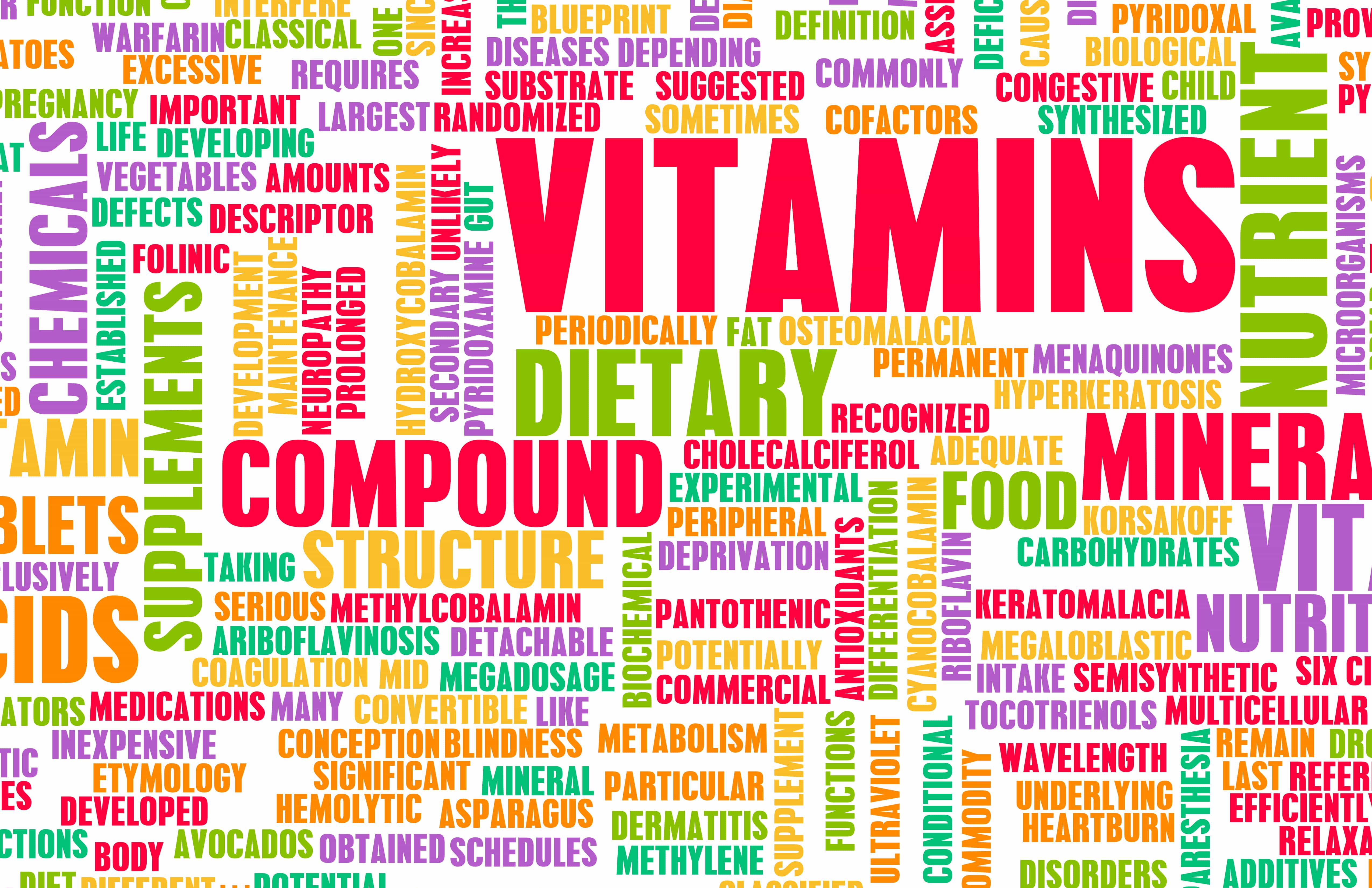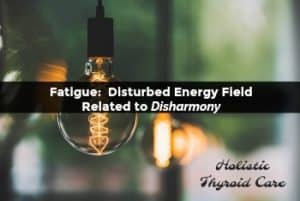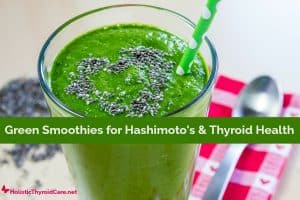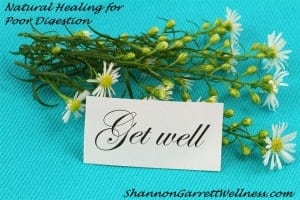
I believe very strongly in supplements and vitamins especially for Hashimoto’s. Read my bio and you’ll understand why – from a very young age in the 1960s I was taught by my grandma the importance of vitamins and food for good health. She definitely promoted the concept that “food is medicine.” But supplements are only one tool in your tool box in addition to diet, sleep, stress management and exercise for supporting thyroid health. Supplements are an excellent addition to a well-rounded wellness plan whether it is digestive support, cardiovascular support, brain health, antiaging, adrenal & thyroid support, memory, mood, bone/joint, hormonal, detoxification, immune system support, and during special life events such as pregnancy. Supplements can be very powerful however, and need to be used correctly: the right supplement, the right dose, at the right time, for the right person, and for the right purpose.
A Quick Word about Adaptogens
Previously we briefly reviewed adaptogens and they are truly a personal favorite because adaptogens have been integral to my healing. Adaptogens are certain herbs that help support the body’s response to stress and bring you back into balance. Examples are things like Astragalus, Ashwagandha extract, Rhodiola rosea and Holy Basil.
The term adaptogen was coined in 1947 when a scientist recognized a certain class of herbs could actually have a positive effect on people. So, if someone had an overactive immune system the adaptogenic herb would bring it down and vice versa. Same with energy issues (but not with caffeine-type effects) so they can actually help with relaxation and a sense of calm or support energy needs when your adrenal glands are tanking.
Adaptogens are fantastic for the immune system, adrenal glands, stress and can help with focus and endurance. These special herbs can also be very powerful for hormone balance. I personally take Rhodiola rosea and Ashwagandha extract every day because of my autoimmune issues that I try to stay on top of.
As far as I’m concerned, adaptogens are necessary to optimal functioning. We need them because life is stressful, the world through news media is sometimes hostile and in general we sometimes can more of a daily sense of urgency about almost everything than ever before.
Why Do People Need Supplements….or Do They?
Do We Need Vitamins & Supplements? http://t.co/aiZdNnStuS
— Shannon Garrett RN (@AutoimmuneRN) September 5, 2014
Our food is not as nutrient dense as it used to be. It actually takes 11 cups of spinach to equal the nutrient content of what just 1 cup of spinach did 9 years ago. The soil is of less quality and lacking in nutrients/minerals. Soil is supposed to be “alive,” rich in living organisms but unfortunately, due to unethical farming practices over the years soil quality is compromised.
We all have different nutritional needs based on our genetics, metabolism, environment and health status. Most women really do benefit from a personalized program. Although there are general recommendations and with the exception of a few targeted supplements for Hashimoto’s, there is no “one size fits all” nutrition or supplement regimen.
Studies published over the last 15 years show our produce is quite low in phytonutrients. So, even if you eat really, really well all the time and consume nutrient rich foods, don’t have any absorption issues, excellent at managing stress, get 8-9 hours of sleep every night, exercise regularly and feel completely optimal you may only need a few basic high quality supplements. Supplements can help to fill in the gap as a supportive mechanism to your health throughout the lifespan.
It is a scientific fact that stress depletes the body of many nutrients. The B vitamins are usually the first to be depleted as a result. Magnesium is another concern because the adrenal glands “use up” a lot of magnesium during stress.
Many women (and men) are low in vitamin D although it may not be low enough to cause rickets. However, they may not be at an optimal level for thyroid and other important health concerns, e.g. the immune system, brain and hormone health, etc. The Recommended Daily Allowance (RDA) number you see on bottles are in a way just plain silly and are definitely outdated. These figures are minimal amount needed to prevent full-blown disease if these nutrients are deficient. Conventional medicine is focused on disease process, not a functional problem – and well, that’s a problem in and of itself. Many in the academic scientific community are making efforts to revise if not throw out the RDA because it is misleading the public.
There is a major difference between being a little depleted and low in vitamins and minerals versus complete malnutrition. Having said this I do believe food is our best medicine…but when that’s not working optimally for any reason this is where supplementation is often necessary.
What to Look for in Vitamins & Supplements
The supplement industry is loosely regulated. And although an entity can manufacture any kind of supplement they want, they are required to register it with the Food and Drug Administration (FDA). What is not required is that the manufacturer does not have to prove what you read on the label is what is in the capsule or tablet. So when you are looking at some of the higher quality scientific-based product lines they will disclose facts about their quality control, manufacturing & standardization practices. They also pass all of their FDA inspections. The public can actually look up information on the FDA.org website to see which supplement manufacturers have received warning letters from the FDA and other important details.
There are a lot of companies out there who say they use only the purest ingredients but you really have to go through a lot of steps to make that claim a reality. For example, let’s say you are looking at a product label and it says it contains vitamin C, D and K in it. And let’s say the manufacturer gets its raw materials from a supplier…if the supplier pre-diluted the ingredients with something else, the manufacturer is not necessarily required to disclose that fact on the label to the public. As a matter of fact, they may not even know what the raw materials were diluted with.
Vitamin D is a perfect example. Pure vitamin D is 40 million units per gram. That’s A LOT and so it must be diluted. High quality manufacturer’s do not use outside suppliers for their raw materials…when a material requires dilution, they will dilute it in their own lab facility and they will use only hypoallergenic constituents in the process. Some companies may dilute with lactose, sodium benzoate or ascorbic acid. Vitamin C might be diluted with cornstarch and lactose but if it comes from the raw material supplier already diluted with those the manufacturer is not required to disclose that on the label. The problem here is that many people like you and me who have autoimmune thyroid disease and need to avoid those ingredients, if the label doesn’t state these products are in the supplement we can find ourselves in big trouble. It’s not fair that companies don’t have to disclose this information.
So with this in mind, it is important to find out if the manufacturer of the brand you use utilizes any unnecessary fillers or excipients. Always look under the “Supplement Facts” box for “other ingredients” and make sure there are no unnecessary colors, additives, gluten, dairy, soy, corn, cornstarch, etc.
Magnesium stearate is another one and it’s not necessarily bad, per se, but it is often used because many pure powdered ingredients are very dry or sticky with botanical oils, so many vitamin manufacturer’s will add magnesium stearate because they are so difficult to mix. Some manufacturers may use lactose or dextrose to make the powders flow through the machines easier, but that could potentially inhibit absorption especially in people who have compromised guts, which often the case in Hashimoto’s and other autoimmune disorders. So this is definitely something to consider. If you see magnesium stearate on the label it may not be a problem unless you are very sensitive and have gut issues. One sign of a high quality supplement manufacturer is that all of their supplements are hypoallergenic.
Capsules should always be selected over tablets – just like pharmaceutical drugs, tablets have some kind of glaze on them sort of like the shellac you would find on furniture so you want to avoid tablets. You also want to look for the most bioavailable ingredients for everything. Here is an example: many women with Hashimoto’s have a genetic SNP for methylenetetrahydrofolate reductase (MTHFR) which means their body doesn’t properly convert folic acid to folate. It’s actually potentially quite serious. So, it is recommended that they use the most bioavailable form which is 5-MTHFR. When looking at the ingredient list, you always to make sure it says “5-MTHFR.” For vitamin B12, you must make sure it says Methycobalamin and not Cyanocobalamin. Always verify that your supplement is hypoallergenic and bioavailable so that it is well absorbed.
SIDENOTE: Many high quality supplement manufacturers even in the United States have the Australian Therapeutic Goods Administration Certification which is the pharmaceutical regulatory agency of Australia. This agency is even more stringent than the United States FDA. So you may want to look for this seal of approval.
In addition to all of this you want to make sure that companies conduct very strict testing. What they typically will do as a reputable and high quality manufacturer is to test each and every raw material that comes in. It will be guaranteed when it first comes in and it will be go through inspection to make sure there are no foreign materials…that there is nothing in it that isn’t supposed to be. Then, when things are mixed or diluted, or if all the vitamins are combined to make a multi, there is another inspection to verify that what the label says is exactly what it is.
In regard to absorption and bioavailability, some supplements are poorly absorbed, e.g. CoQ10 and curcumin. Curcumin is the main component of the spice turmeric and is what makes it anti-inflammatory and gives curry powder its deep yellow color. It is very poorly absorbed whether it is a food or a supplement. You really need to eat quite a lot of it and you need to eat it with fat to see any kind of difference at all. What some manufacturers are now doing with curcumin is to bind it to phosphatidylcholine and call it a phytosome. Anytime you see the term phytosome, this is what it means whether it’s green tea, grapeseed, or anything else, etc., it means a particular substance has been bound with phosphatidylcholine for transport into the cell. Every cell in the human body has a phospholipid bilayer, so when you bind a compound like curcumin to phosphatidylcholine, it can then cross the cells lipid layer much easier so that you get better absorption. There are many studies that have been done on this particular phytosome for curcumin and it’s called Meriva. Pure Encapsulations makes a good product called CurcumaSorb which was previously called Meriva. Basically it is curcumin that is bioavailable, or easily absorbed. If you search PubMed you will find many studies that show 20 to 29 time’s greater absorption of curcumin with Meriva. There is also published information on it for inflammation, joint pain, irritable bowel disease, eliminating the side effects of cancer treatment and much more so this technology is definitely something else for you to be aware of.
Other Tidbits:
Genetically Modified Organisms (GMOs) & Supplements: Always be sure to ask you supplement or vitamin manufacturer what their stance is and what they’re doing to avoid GMOs including corn.
Soy Protein, Soy Isoflavones, Soy Lecithin & Supplements: Soy protein & soy isoflavones are not the same thing as soy lecithin. Here’s why:
- Soy lecithin is not the food.
- Soy lecithin is many, many steps removed from the food source.
- Soy lecithin – even if you have a reactivity to soy it is either to the isoflavones or to the soy protein.
- Soy lecithin should not cause any problems because there are no soy proteins or soy isoflavones in it; soy lecithin is literally only the extracted phospholipids from the lecithin – very, very, very (did I say very?!!) far removed from the original soy food product.
Whole-Foods Based vs. Synthetics:
Surprisingly, it is difficult to ensure potency with whole food supplements.
Whole Food-based supplements usually have synthetic ingredients added in to make sure that when it’s tested, the amount it says it has on the label is actually going to be in the product.
How to Know What You Need
There are many lab tests available today to see what vitamin and mineral deficiencies you may have in addition to any genetic and other health issues. SpectraCell Labs is excellent for vitamin and mineral analyses. If you haven’t had this micronutrient test be sure to ask your doctor about it. The normal CBC ordered in your doctor’s office for an annual physical does not check for vitamins and minerals, nor does it test for example the gene SNP MTHFR which is very important to confirm or rule out.






